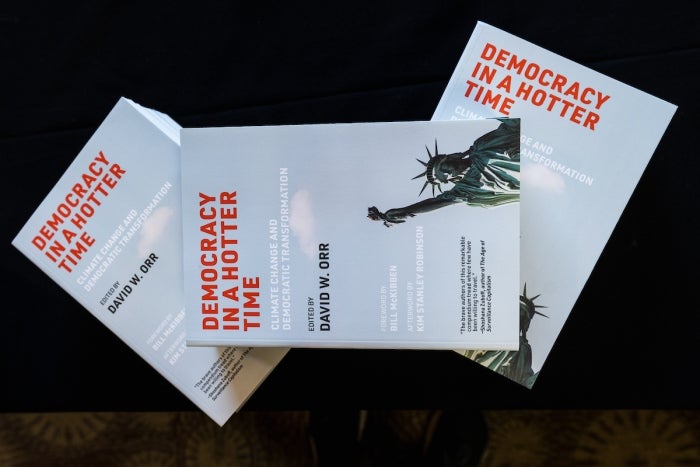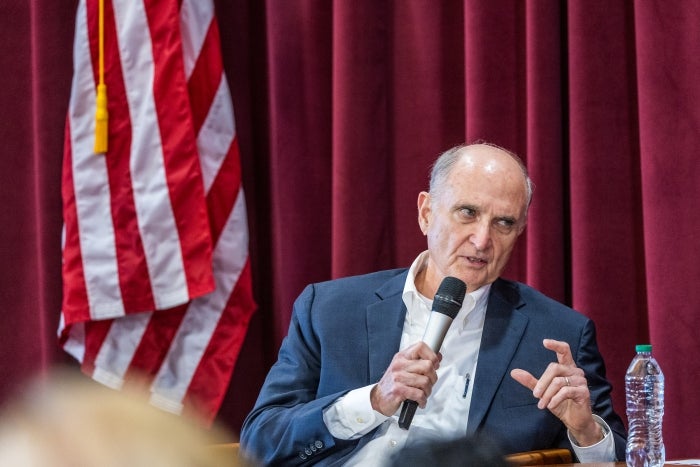Higher education's role in addressing democracy, climate change

ASU President Michael Crow (right) speaks with Professor of Practice David Orr at the launch of the Orr-edited book, “Democracy in a Hotter Time,” on Tuesday, Aug. 27, at Old Main on ASU's Tempe campus. The two scholars explored the complex crises of democracy and climate change, and the ramifications for the future of humanity. Photo by Charlie Leight/ASU News
During a conversation Tuesday with David Orr, a professor of practice in The College of Liberal Arts and Sciences, Arizona State University President Michael Crow was asked what profession he would consider if he was 18 years old again.
Crow didn’t hesitate. He said he’d pick the same career path.
“I don’t have a specific job (in mind), but I just have this thing that, in our society, if done right, the universities and the colleges are powerful tools for adaptation to the future,” Crow said. “I became hugely enamored with learning as a child. So, I think I would do the same thing, but I would try to learn more, learn more broadly, learn more quickly and figure out better ways to teach and better ways to communicate.”
The Q&A session with Orr and Crow in the Carson Ballroom of Old Main was the keynote portion of a two-day event celebrating the book launch of “Democracy in a Hotter Time,” a look at the intersection of democracy and climate change. The book was edited by Orr, and Crow was one of the contributors.
The event was two days of talks on such topics as law, international politics and communications, featuring voices from across ASU and from Johns Hopkins University, New America, the Small Planet Institute, the University of Denver, Washburn University and the University at Buffalo.
“The key to the story here at ASU is that America isn’t done,” Crow said during Tuesday's keynote. “Our path to the democratic ideals that so many of us love and aspire to see further in our country isn’t done. And that includes higher education.”
Crow said one of the responsibilities universities and colleges must undertake is educating young people on issues like climate change and sustainability. Starting with the 2024–25 school year, ASU requires that all newly admitted students take a course on sustainability.
“One of our problems with climate change is that people don’t even know what we’re talking about,” Crow said. "They have no idea. They think it’s about whether or not it snows or rains or whether or not it’s a little bit hotter in July than it was when I was a kid.
“That isn’t what it’s about. It’s about the entire energetic system of the planet and our role in that. So, what I’m hoping in the next 75 years is that we find a way to have more positive engagement in the understanding ... of the entire population.”
Orr asked Crow what a university’s role should be in trying to navigate the political chasm that exists today. Crow said a university must stay focused on determining what people really want. He noted that ASU’s Center for the Future of Arizona has found that there are “eight or nine” areas of shared public values.
For example, Crow said, more than 90% of the people in Arizona want a sustainable future. More than 75% want health care access for everyone.
“When you get to 75%, 80% and 90% in a democracy, that is a sufficient consensus to move forward and make things happen,” Crow said.
Crow added that universities also need to maintain and protect free speech, be open to new ideas, understand history and not allow falsehoods to be perpetrated.
“We’re here to allow for the expression of ideas and the expression of free speech,” he said. “That’s what democracy is. It’s a place where you bring your ideas to the table and then you argue it out. So, I’m like, bring on the arguments, but follow the rules. Bring on the new ideas, but follow the rules.
“You have a better idea about what should be taxed or a better idea of how to run a government, let’s hear it. Let’s look at it. I have no problem whatsoever with all the different views and all the different ways that people look at things. That’s all fantastic.”
In 2020, Crow and William Dabars, a senior research fellow in ASU’s Office of University Affairs, co-authored a book titled “The Fifth Wave: The Evolution of American Higher Education.” The first four waves, Crow said, were the colonial colleges, the emergence of public colleges in the United States, the building of land-grant universities and the emergence of American research universities.
Crow told Orr that ASU is a prototype of the fifth wave, a “new kind of university.”
“We need large-scale institutions working at the level of social change and the speed of social dynamics,” Crow said. “I would say there’s a possibility that this wave could get going. … Progress is being made and innovations are occurring.”
At ASU, Crow said, the focus is on producing a “master learner,” a student who can learn at higher levels of complexity or importance, including a knowledge of sustainability and understanding of its importance.
“You have the built environment, which is everything that we’ve made, all of our structures, our societies, our systems, our energy tools, all of our existence,” Crow said. “And then there’s the Earth without us, the natural system that we’re a part of and have grown from. Sustainability is building the sustainable outcome of a relationship between the built environment and the natural environment.
“We’re not on a sustainable path now. We’re not moving toward a sustainable set of outcomes. So, what we’re hoping to do is educate the ASU students that will be graduating so that they have some chance of understanding these levels of complexity so that they’re learning going forward. …
"We’re trying to make certain that the 2055 thinker has been enabled to think about the actual issues of how the planet works, our role on the planet and sustainability of the planet’s relationship with us.”
More Environment and sustainability

2 ASU faculty elected as AAAS Fellows
Two outstanding Arizona State University faculty spanning the physical sciences, psychological sciences and science policy have been named Fellows of the American Association for the Advancement of…

Homes for songbirds: Protecting Lucy’s warblers in the urban desert
Each spring, tiny Lucy’s warblers, with their soft gray plumage and rusty crown, return to the Arizona desert, flitting through the mesquite branches in search of safe places to nest.But as urban…

Public education project brings new water recycling process to life
A new virtual reality project developed by an interdisciplinary team at Arizona State University has earned the 2025 WateReuse Award for Excellence in Outreach and Education. The national …



